The Devotee Wears Prada
By Madhava Smullen | Oct 25, 2016
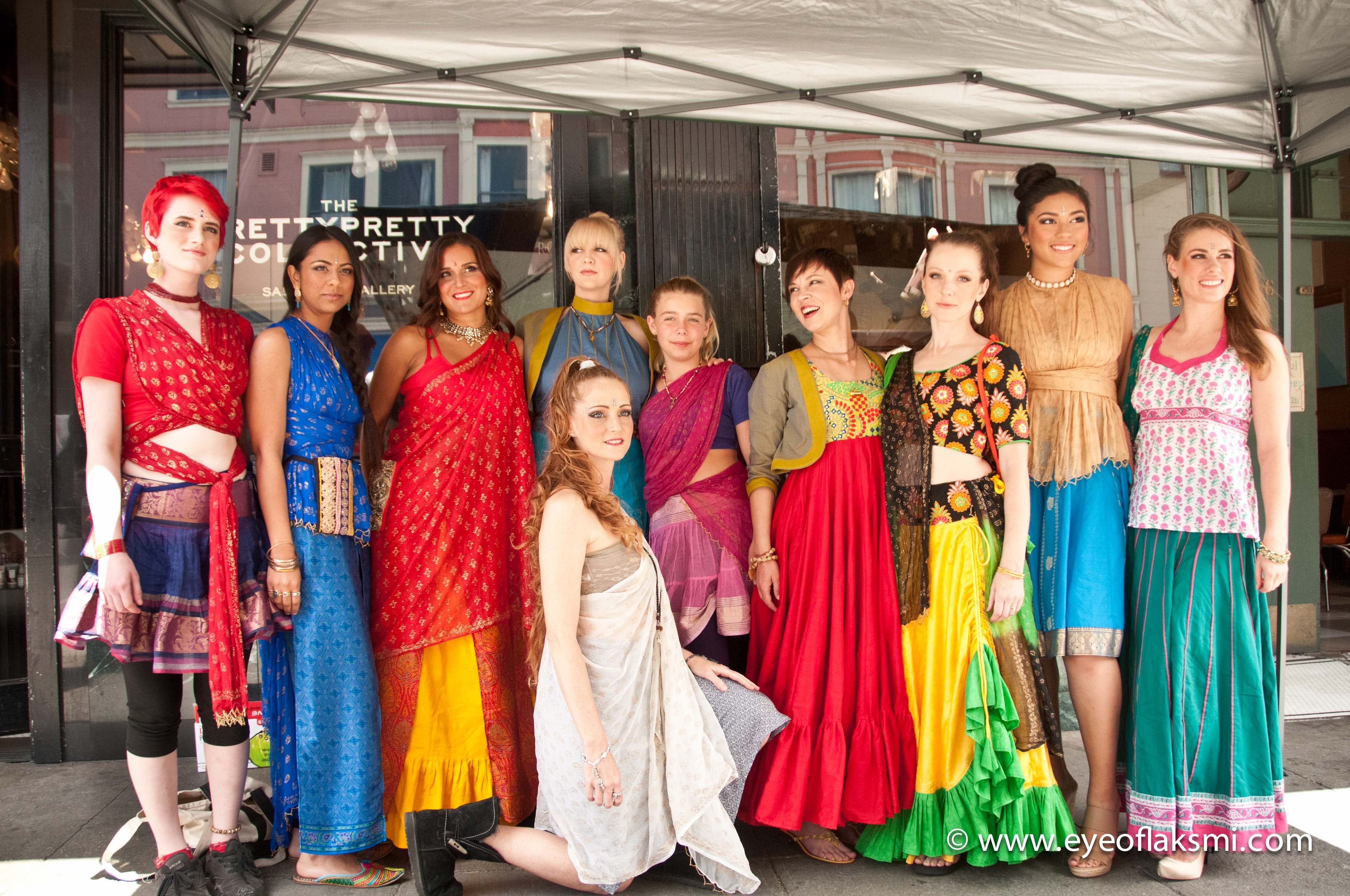
As ISKCON grows beyond the missionary core that started it, with congregations of families, professionals, and artists, its spiritual and cultural contribution has begun to be felt in all areas of life.
Fall is the perfect time to look at one of those areas – fashion – where ISKCON is seeing a second-generation-led explosion lately. That explosion is being embraced by the ISKCON devotee congregation, as well as reaching the yoga community and beyond, into the mainstream.
Should Hare Krishnas care about fashion? The success of many Kuli-led fashion companies suggests that they already do. And designers say that’s a good thing, boosting self-esteem, inspiring enthusiasm to attend temple festivals, and allowing us to visually communicate who we are.
So while devotees may not be wearing Prada, they are wearing these designers:
Gopi Skirts by Radhika: The Colorful Trendsetter

When Radhika Garvey began making cotton skirts for herself eleven years ago as an easy-to-wear, comfortable and cruelty-free alternative to silk saris, she didn’t know she was contributing to the start of a major new international trend.
As she began making her skirts in Vrindavan, India, they spread like wildfire through an ISKCON that previously used only saris or wrap-arounds, becoming the new must-haves.
Today, Gopi Skirts by Radhika are still hugely popular, selling to dancers and the yoga community as well as devotees. Inspired by Krishna art of the gopis, they consist of a long skirt (lengha), blouse (choli), and scarf (dupatta) made with traditional Orissan, South Indian and Jaipur Bandini fabrics. Dramatic and eye-poppingly colorful, they’re known for giving wearers that perfect “spin” while dancing in kirtan.
“I had so many young girls writing to me saying, ‘They’re so easy to put on, I feel beautiful and good about what I’m wearing, and it’s inspired me to start going to the temple again,’” says Radhika. “I know that’s a material reason, but I think it’s important for girls and women to feel good about what they’re wearing like that. It’s empowering.”
Radhika also makes cotton gopi skirts and dhotis for children, as well as handstitched wedding outfits. Most importantly, her business is done as a service — Radhika donates all of her profits to the Laguna Beach temple and Deities.
GanJam Tribe – The Artists with Atittude
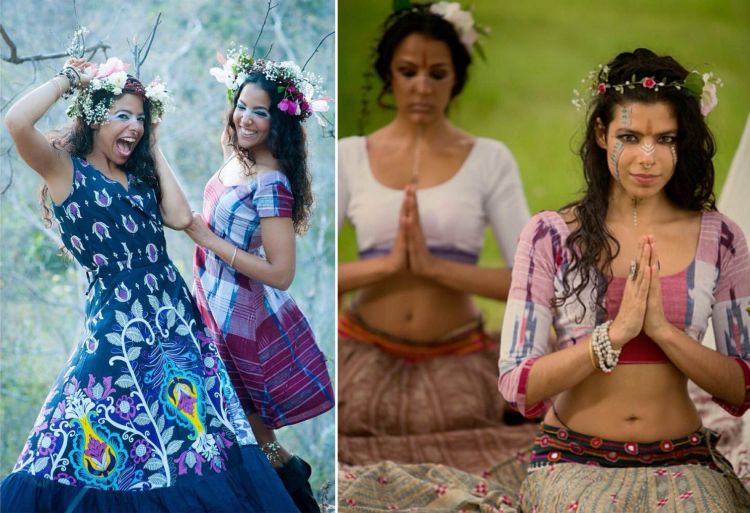
Like Radhika, sisters Ganga and Jamuna Sheth began designing clothes for themselves, and launched a business when more and more people started making requests.
Bold and edgy, their designs are inspired by the tribal peoples of India, particularly Rajasthan, with a streetwise attitude. Items of clothing include skirts, blouses, pants, shawls, button-down long tops, and hoodies. More earthy with pops of color, expect intricate designs, peacock feathers, and the unexpected.
“We try to combine today’s fashion with the authentic rawness that you can only get in villages in India,” Ganga says. “We use fabrics from Jagannath Puri, Rajasthan and beyond. And each piece is one of a kind – you’ll never get two skirts that are the same.”
What inspires Ganga and Jamuna more than their business, they say, is how it enables them to give back. Their project “Love Handles” will distribute donated warm clothes to underprivileged children, families and widows in Krishna’s hometown of Vrindavana this winter. And their “Two Dollars, Two Sisters, Two Causes” will send all profits from designer bag sales to support girls at Sandipani Muni School and cows at Kurma Rupa’s Goshala, also in Vrindavana.
To Ganga and Jamuna, fashion helps keep Krishna consciousness trendy. “We want Krishna consciousness to thrive, and to be accessible to everyone,” Ganga says. “We want to say, ‘You can be part of this culture and still be you, and be stylish.’ And of course, when we look bright and presentable, that attracts newcomers to find out more.”
Message GanJam at https://www.facebook.com/ganjamtribe/
Sita Bell – The Ethical Pro
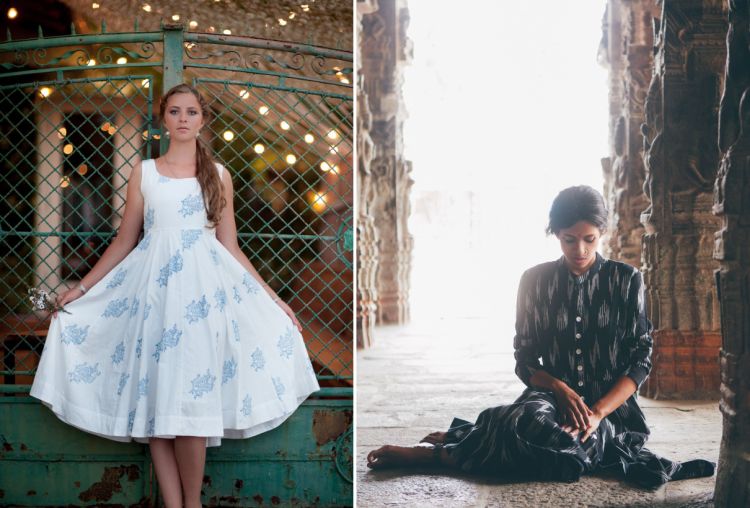
A graduate from the London College of Fashion, Sita makes everyday wear for working professionals who want to look smart while wearing something that represents their spiritual and ethical beliefs.
Simple, stylish and clean-cut, her garments include high-necked Victorian-influenced dresses, flowing Anarkalis, tailored jackets and button-down shirts with Nehru collars. Modest and feminine, they are inspired by the gopis’ qualities and aim to make women feel special, empowered and graceful.
Many feature hand-carved buttons, and are adorned with elaborate henna or floral designs made in Bangalore with a traditional block-print technique. In line with Sita’s ethical principles, they are colored with environmentally-friendly vegetable dyes and made with hand-loomed organic cotton by family businesses in South India who have worked on wooden looms for generations.
“I want to support them, because it’s the way people have done things for thousands of years, and they are dying out,” Sita says.
Sita’s clientele are generally women from 20 to 50 with an interest in yoga and conscious living and the income to afford her one-of-a-kind pieces.
“My clothes are also being received really well in the devotee world, because you can wear them both at the temple and at work or out at an event,” she says.
Next year, Sita aims to introduce men and children’s clothing too.
Visit http://sitabell.com
Gita Soto – The New Model
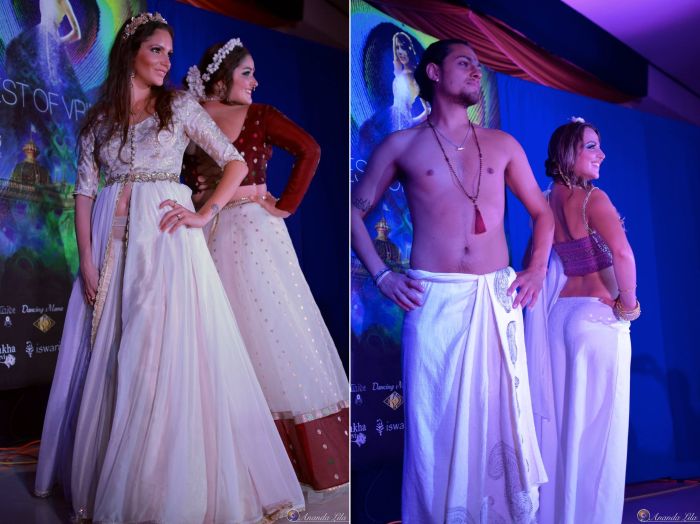
A former model and actress in Bollywood, and now a full-time mother in Alachua, Florida to three-year-old Vayu, British Gita Soto only recently began her own make-to-order business.
Drawing from her background in fashion, she began taking her first sewing lessons from senior devotee Shranti Dasi in Alachua. She then became encouraged when her contribution to the fashion show at this June’s Kuli Mela, an ISKCON second-generation event, made a big impression.
“Right off, two people approached me to make their wedding outfit,” she says. “That’s when I realized my hobby was something I could share with the world.”
Finding saris beautiful but uncomfortable and impractical, especially in hot and humid climates like Florida, Gita contemporizes Indian designs to create her own styles. She makes both full and knee-length gopi skirts, long-sleeve and sleeveless cholis, anarkalis, and pants and jackets too. Like Sita Bell, she uses block prints, but with her own spin, adding peace signs, zebras, the Eiffel tower and more along with typical Indian subjects like cows and elephants.
“What’s unique about my clothes is that because I make everything myself, they can be tailored to the individual,” she says. “I can change fabrics, fits, anything.”
Write to Gitasoto@gmail.com.
Dancing Mama KD – The Practical Yogi
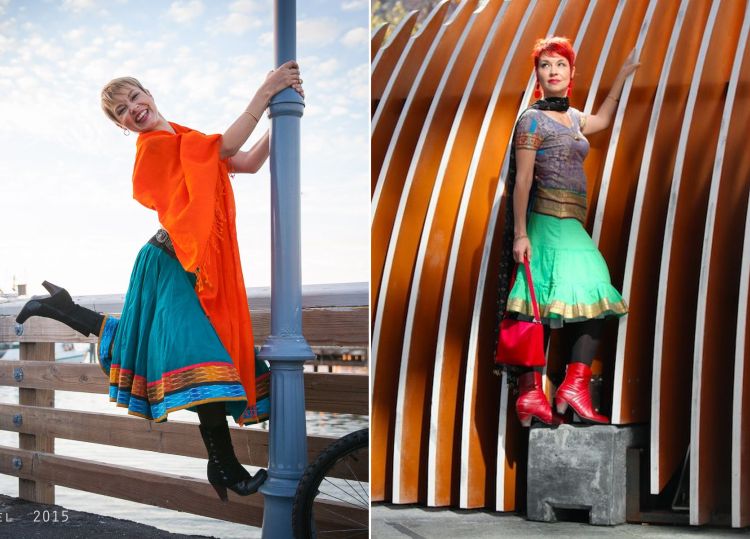
Krishna Devata McComb of Dancing Mama KD developed a love of fashion early on in life, watching her mother drape saris, sew for her local temple’s Deities and her family, and pick Vogue sewing patterns.
Her designs are inspired by the Krishna and Indian culture she grew up with, but suited to everyday life in America rather than temple life.
“As a Yoga Teacher and mother, my life is active, practical and colorful,” she says. “Freedom, range of movement, modesty, grace and fun are all aspects of my designs. I make genie Yogini Pants, ruffle “Yoga Tutus” worn over yoga pants, and hands-free pashmina “Devi Drapes” that don’t fall off during dance, teaching or grocery shopping.”
Krishna Devata sells to Bay Area Bhakti Yogis and the yoga community in her home town of Sonoma, Northern California, and is beginning to cross over into the mainstream market too.
“My company is just as much about loving relationships as it is about a livelihood,” she says. “I live in a town where there are no devotees, and have been asked to teach ‘India Village Dance’ i.e. Kirtan Dance, just so people can wear my skirts! My clothing also invites conversation and inspires deeper inquiry into my Krishna culture story.”
Meanwhile like many other kuli designers, K.D. likes to give back. Last winter, she distributed over 150 wool shawls at ashrams for widows, or placed them over people sleeping on the cold ground on temple steps. Her service was acknowledged by the San Francisco Earth Day Fashion Show, which featured Dancing Mama designs.
Krishna Devata also produced the Kuli Mela Fashion Show, investing her own money in it to support kulis and the fact that they are “stepping forward as designers, contributing to the cultural revolution Srila Prabhupada encouraged.”
“Hare Krishna devotees have been making a fashion statement since the 1960s,” she says. “It’s part of our culture. When we can step into a public domain or into the temple room and portray beauty, talent, and conscious clothing sources, that is Krishna Consciousness and can be respected and supported as a viable industry. It is a devotee dream to be able to be in a business that fulfills our propensity in service to others.”
K.D.’s designs are currently only available in her basement boutique and exclusive events. For more details, contact her at TheDancingMama@gmail.com, or visit https://www.facebook.com/DancingMamaBoutique















